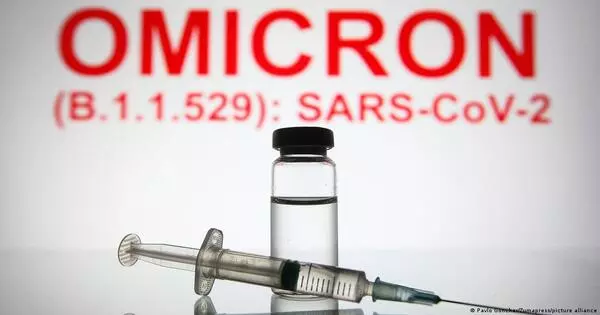Preclinical studies for a vaccine developed at MedUni Vienna to defend against SARS-CoV-2 show that it is effective against all SARS-CoV-2 variants known to date, including omicron—even in people who have not yet developed immunity as a result of immunization (non-responders). The study’s findings were recently published in the journal Allergy.
The antigen-based vaccine developed at MedUni Vienna by Rudolf Valenta of the Center for Pathophysiology, Infectiology, and Immunology targets the receptor binding domains (RBD) of the SARS-CoV-2 virus and induces a robust and uniform RBD-specific IgG antibody response in animal models and human tests. This antibody response inhibits the virus from docking on and entering the cells of the body, preventing infection.
Coronavirus vaccination combined with hepatitis B vaccine
The SARS-CoV-2 subunit vaccine (PreS-RBD) developed at MedUni Vienna is based on a structurally folded fusion protein made up of two receptor binding domains (RBD) of the SARS-CoV-2 virus and the PreS antigen from hepatitis B that act as immunological carriers for each other, thereby strengthening the immune response. The current genetic SARS-CoV-2 vaccines primarily induce temporary IgG1 antibody responses, whereas the PreS-RBD vaccination can also induce long-lived RBD-specific IgG4 antibodies.
PreS-RBD IgG antibodies found in blood and mucosal secretions respond to SARS-CoV-2 variations, including the omicron form. Antibodies generated by PreS-RBD vaccination blocked RBD’s binding to its human receptor ACE2 more potently, and their virus-neutralizing titers were higher than those in a random sample of people fully immunized with two vaccinations of already registered vaccines or COVID-19 convalescents (i.e., individuals who had previously had COVID-19).

Immunity is granted even to past “non-responders.”
PreS-RBD vaccination has the potential to produce sterilizing immunity against old and new SARS-CoV-2 variations by preventing infection by inhibiting viral reproduction and transmission through cellular virus entry, study leader Rudolf Valenta adds. Furthermore, it is believed that the vaccine will be effective in people who have not previously responded to vaccination (“RBD non-responders”) because the PreS element of the vaccine will provide additional T-cell support. Valenta and colleagues discovered that roughly 20% of those recovered from COVID-19 failed to produce RBD-specific antibodies, putting them at persistent danger of re-infection.
The findings are based on decades of allergy research at MedUni Vienna.
The creation of this Austrian COVID vaccine was heavily influenced by decades of allergy vaccine design knowledge. Previous research on allergy vaccines, as well as clinical studies with PreS-based allergy vaccines, has shown that PreS-based vaccines are safe even when administered frequently.
“Our findings give us reason to believe that this easily produced protein-based vaccine antigen will be effective against all known SARS-CoV-2 variations, including omicron,”
Rudolf Valenta
“Our findings give us reason to believe that this easily produced protein-based vaccine antigen will be effective against all known SARS-CoV-2 variations, including omicron,” explains study leader Rudolf Valenta. “The vaccine is intended to allow repeated injections to build up prolonged sterilizing immunity, is appropriate for use in all age and risk categories, and appears to be superior to currently available vaccinations in terms of producing neutralizing antibodies.” If adequate financing is obtained, the first clinical trials required for approval could be conducted this year.





